- Home
- John le Carré
The Russia House Page 3
The Russia House Read online
Page 3
Barley Blair, he thought in amazement as he opened his wardrobe and hauled out the large aluminium hand-case where he kept his samples. Well, well. We often wondered whether we were nurturing a spy in our midst and now we know.
Landau’s calm was absolute, he assured me. The Englishman had once more taken command of the Pole. ‘If Barley could do it, I could, Harry, that’s what I said to myself.’ And it was what he said to me too, when for a short spell he appointed me his confessor. People do that to me sometimes. They sense the unrealised part of me and talk to it as if it were the reality.
Lifting the case on to the bed he snapped the locks and drew out two audio-visual kits that the Soviet officials had ordered him to remove from his display – one pictorial history of the twentieth century with spoken commentary which they had arbitrarily ruled to be anti-Soviet, one handbook of the human body with action photographs and a keep-fit exercise cassette, which, after gazing longingly at the pliant young goddess in the leotard, the officials had decided was pornographic.
The history kit was a glossy affair, built as a coffee-table book and containing a quantity of interior pockets for cassettes, parallel texts, progressive vocabulary cards and students’ notes. Having emptied the pockets of their contents, Landau offered the notebooks to each in turn but found none large enough. He decided to convert two pockets into one. He fetched a pair of nail scissors from his sponge bag and set to work with steady hands, easing the steel staples out of the centre divide.
Barley Blair, he thought again as he inserted the point of the nail scissors. I should have guessed, if only because you were the one it couldn’t possibly be. Mr. Bartholomew Scott Blair, surviving scion of Abercrombie & Blair – spy. The first staple had come loose. He gingerly extracted it. Barley Blair, who couldn’t sell hay to a rich horse to save his dying mother on her birthday, we used to say: spy. He began prising the second staple. Whose principal claim to fame was that two years ago at the Belgrade book fair he had drunk Spikey Morgan under the table on straight vodkas, then played tenor sax with the band so beautifully that even the police were clapping. Spy. Gentleman spy. Well, here’s a letter from your lady, as they say in the nursery rhyme.
Landau picked up the notebooks and offered them to the space he had prepared but it was still not big enough. He would have to make one pocket out of three.
Playing the drunk, thought Landau, his mind still on Barley. Playing the fool and fooling us. Burning up the last of your family money, running the old firm deeper into the ground. Oh yes. Except that somehow or another you always managed to find one of those smart City banking houses to bail you out in the nick of time, didn’t you? And what about your chess-playing then? That should have been a clue, if Landau had only had eyes for it! How does a man who’s drunk himself silly beat all comers at chess then, Harry – straight games – if he isn’t a trained spy?
The three pockets had become one pocket, the notebooks fitted more or less inside, the printed indication above them still read ‘Student Notes’.
‘Notes,’ Landau explained in his mind to the inquisitive young customs officer at Sheremetyevo airport. ‘Notes, you see, son, like it says. Student’s notes. That’s why there’s a pocket here for notes. And these notes that you are holding in your hand are the work of an actual student following the course. That’s why they’re here, son, do you see? They are demonstration notes. And the drawings here, they’re to do with the –’
With socio-economic patterns, son. With demographic population shifts. With vital statistics that you Russkies can never get enough of, can you? Here, seen one of these? It’s called a body book.
Which might or might not save Landau’s hide, depending on how smart the boy was, and how much they knew, and how they felt about their wives that day.
But for the long night ahead of him, and for the dawn raid when they kicked the door down and burst in on him with drawn pistols and shouted, ‘All right, Landau, give us the notebooks!’ – for that happy moment, the kit wouldn’t do at all. ‘Notebooks, Officer? Notebooks? Oh, you mean that bunch of junk some loony Russian beauty pressed on me at the fair tonight. I think you’ll probably find them in the rubbish basket, Officer, if the maid hasn’t emptied it for once in her life.’
For this contingency also, Landau now meticulously set the scene. Removing the notebooks from the pocket of the history kit, he placed them artistically in the wastepaper basket exactly as if he had flung them there in the rage he had felt when he had taken his first look. To keep them company, he tossed in his surplus trade literature and brochures, as well as a couple of useless farewell gifts he had received: the thin volume of yet another Russian poet, a tin-backed blotter. As a final touch, he added a pair of undarned socks that only your rich Westerner throws away.
Once again I must marvel, as later we all did, at Landau’s untutored ingenuity.
Landau did not go out and play that night. He endured the familiar imprisonment of his Moscow hotel room. From his window he watched the long dusk turn to darkness and the dim lights of the city reluctantly brighten. He made himself tea in his little travelling kettle and ate a couple of fruit bars from his iron rations. He dwelt gratefully upon the most rewarding of his conquests. He smiled ruefully at others. He braced himself for pain and solitude and summoned up his hard childhood to help him. He went through the contents of his wallet and his briefcase and his pockets and took out everything that was particularly private to him which he would not wish to answer for across a bare table – a hot letter a little friend sent him years ago that could still revive his appetites, membership of a certain video-by-mail club that he belonged to. His first instinct was to ‘burn them like in the movies’ but he was restrained by the sight of the smoke detectors in the ceiling, though he’d have laid any money they didn’t work.
So he found a paper bag and, having torn up everything very small, he put the pieces in the bag, dropped the bag out of the window and saw it join the rubbish in the courtyard. Then he stretched himself out on the bed and watched the dark go by. Sometimes he felt brave, sometimes he was so scared that he had to drive his fingernails into his palms to hold himself together. Once he turned on the television set, hoping for nubile girl gymnasts, which he liked. But instead he got the Emperor himself telling his bemused children for the umpteenth time that the old order had no clothes. And when Spikey Morgan, half drunk at best, telephoned from the bar of the National, Landau kept him on the line for company till old Spikey fell asleep.
Only once and at his lowest point did it cross Landau’s mind to present himself at the British Embassy and seek the assistance of the diplomatic bag. His momentary weakness angered him. ‘Those flunkeys?’ he asked himself in scorn. ‘The ones who sent my dad back to Poland? I wouldn’t trust them with a picture postcard of the Eiffel Tower, Harry.’
Besides, that wasn’t what she had asked him to do.
In the morning he dressed himself for his own execution, in his best suit, with the photograph of his mother inside his shirt.
And that is how I see Niki Landau still, whenever I dip into his file, or receive him for what we call a six-monthly top-up, which is when he likes to relive his hour of glory before signing yet another declaration of the Official Secrets Act. I see him stepping jauntily into the Moscow street with the metal suitcase in his hand, not knowing from Adam what’s in it, but determined to risk his brave little neck for it anyway.
How he sees me, if he ever thinks of me, I dare not wonder. Hannah, whom I loved but failed, would have no doubt at all. ‘As another of those Englishmen with hope in their faces and none in their hearts,’ she would say, flushing with anger. For I am afraid she says whatever comes to her these days. Much of her old forbearance is gone.
2
The whole of Whitehall was agreed that no story should ever begin that way again. Indoctrinated ministers were furious about it. They set up a frightfully secret committee of enquiry to find out what went wrong, hear witnesses, name names, spare no blushe
s, point fingers, close gaps, prevent a recurrence, appoint me chairman and draft a report. What conclusions our committee reached, if any, remains the loftiest secret of them all, particularly from those of us who sat on it. For the function of such committees, as we all well knew, is to talk earnestly until the dust has settled, and then ourselves return to dust. Which, like a disgruntled Cheshire cat, our committee duly did, leaving nothing behind us but our frightfully secret frown, a meaningless interim working paper, and a bunch of secret annexes in the Treasury archives.
It began, in the less sparing language of Ned and his colleagues at the Russia House, with an imperial cock-up, between the hours of five and eight-thirty on a warm Sunday evening, when one Nicholas P. Landau, travelling salesman and taxpayer in good standing, if of Polish origin, with nothing recorded against, presented himself at the doors of no fewer than four separate Whitehall ministries to plead an urgent interview with an officer of the British Intelligence Branch, as he was pleased to call it, only to be ridiculed, fobbed off and in one instance physically manhandled. Though whether the two temporary doormen at the Defence Ministry went so far as to grab Landau by the collar and the seat of his pants, as he maintained they did, and frogmarch him to the door, or whether they merely assisted him back into the street, to use their words, is a point on which we were unable to achieve a consensus.
But why, our committee asked sternly, did the two doormen feel obliged to provide this assistance in the first place?
Mr. Landau refused to let us look inside his briefcase, sir. Yes, he offered to let us take charge of the briefcase while he waited, provided he kept charge of the key, sir. But that wasn’t regulations. And yes, he shook it in our faces, patted it for us, tossed it about in his hands, apparently in order to demonstrate that there was nothing in it that any of us needed to be afraid of. But that wasn’t regulations either. And when we tried with a minimum of force to relieve him of the said briefcase, this gentleman – as Landau in their testimony had belatedly become – resisted our efforts, sir, and shouted loudly in a foreign accent, causing a disturbance.
But what did he shout? we asked, distressed by the notion of anybody shouting in Whitehall on a Sunday.
Well, sir, so far as we were able to make him out, him in his emotional state, he shouted that this briefcase of his contained highly secret papers, sir. Which had been entrusted to him by a Russian, sir, in Moscow.
And him a rampageous little Pole, sir, they might have added. On a hot cricketing Sunday in London, sir, and us watching the replay of the Pakistanis against Botham in the back room.
Even at the Foreign Office, that freezing hearth of official British hospitality, where the despairing Landau presented himself as a last resort and with the greatest of reluctance, it was only by dint of high entreaty and some honest-to-God Slav tears that he fought his way to the rarefied ear of the Honourable Palmer Wellow, author of a discerning monograph on Liszt.
And if Landau had not used a new tactic, probably the Slav tears would not have helped. Because this time he placed the briefcase open on the counter so that the doorman, who was young but sceptical, could crane his pomaded head to the recently installed armoured glass and scowl down into it with his indolent eyes, and see for himself that it was only a bunch of dirty old notebooks in there and a brown envelope, not bombs.
‘Come-back-Monday-ten-to-five,’ the doorman said through the wonderfully-new electric speaker, as if announcing a Welsh railway station, and slumped back into the darkness of his box.
The gate stood ajar. Landau looked at the young man, and looked past him at the great portico built a hundred years earlier to daunt the unruly princes of the Raj. And the next thing anyone knew, he had picked up his briefcase and, defeating all the seemingly impenetrable defences set up to prevent exactly such an onslaught, was pelting hell-for-leather with it – ‘like a bloomin’ Springbok, sir’ – across the hallowed courtyard up the steps into the enormous hall. And he was in luck. Palmer Wellow, whatever else he was, belonged to the appeasement side of the Foreign Office. And it was Palmer’s day on.
‘Hullo, hullo,’ Palmer murmured as he descended the great steps and beheld the disordered figure of Landau panting between two stout guards. ‘Well you are in a muck. My name’s Wellow. I’m a resident clerk here.’ He held his left fist to his shoulder as if he hated dogs. But his right hand was extended in greeting.
‘I don’t want a clerk,’ said Landau. ‘I want a high officer or nothing.’
‘Well, a clerk is fairly high,’ Palmer modestly assured him. ‘I expect you’re put off by the language.’
It was only right to record – and our committee did – that nobody could fault Palmer Wellow’s performance thus far. He was droll but he was effective. He put no polished foot wrong. He led Landau to an interviewing room and sat him down, all attention. He ordered a cup of tea for him with sugar for his shock, and offered him a digestive biscuit. With a costly fountain pen given him by a friend, he wrote down Landau’s name and address and those of the companies that hired his services. He wrote down the number of Landau’s British passport and his date and place of birth, 1930 in Warsaw. He insisted with disarming truthfulness that he had no knowledge of intelligence matters, but undertook to pass on Landau’s material to the ‘competent people’, who would no doubt give it whatever attention it deserved. And because Landau once again insisted on it, he improvised a receipt for him on a sheet of Foreign Office blue draft, signed it and had the janitor add a date-and-time stamp. He told him that if there was anything further the authorities wished to discuss they would very probably get in touch with him, perhaps by means of the telephone.
Only then did Landau hesitatingly pass his scruffy package across the table and watch with lingering regret as Palmer’s languid hand enfolded it.
‘But why don’t you simply give it to Mr. Scott Blair?’ Palmer asked after he had studied the name on the envelope.
‘I tried, for Christ’s sake!’ Landau burst out in fresh exasperation. ‘I told you. I rang him everywhere. I’ve rung him till I’m blue in the face, I tell you. He’s not at his home, he’s not at work, he’s not at his club, he’s not at anywhere,’ Landau protested, his English grammar slipping in despair. ‘From the airport I tried. All right, it’s a Saturday.’
‘But it’s Sunday,’ Palmer objected with a forgiving smile.
‘So it was a Saturday yesterday, wasn’t it! I try his firm. I get an electronic howl. I look in the phone book. There’s one in Hammersmith. Not his initials but Scott Blair. I get an angry lady, tells me to go to hell. There’s a rep I know, Archie Parr, does the West Country for him. I ask Archie: “Archie, for Christ’s sake, how do I get hold of Barley in a hurry?” “He’s skedaddled, Niki. Done one of his bunks. Hasn’t been seen in the shop for weeks.” Enquiries, I try. London, the Home Counties. Not listed, not a Bartholomew. Well he wouldn’t be, would he, not if he’s a –’
‘Not if he’s a what?’ said Palmer, intrigued.
‘Look, he’s vanished, right? He’s vanished before. There could be reasons why he vanishes. Reasons that you don’t know of because you’re not meant to. Lives are at stake, could be. Not only his either. It’s top urgent, she told me. And top secret. Now get on with it. Please.’
The same evening, there being not much doing on the world front apart from a dreary crisis in the Gulf and a squalid television scandal about soldiers and money in Washington, Palmer took himself off to a rather good party in Montpelier Square that was being thrown by a group of his year from Cambridge – bachelors like himself, but fun. An account of this occasion, too, reached our committee’s ears.
‘Have any of you heard of a Somebody Scott Blair, by the by?’ Wellow asked them at a late hour when his memory of Landau happened to have been revived by some bars of Chopin he was playing on the piano. ‘Wasn’t there a Scott Blair who was up with us or something?’ he asked again when he failed to get through the noise.
‘Couple of years ahead of us. Trinity
,’ came a fogged reply from across the room. ‘Read History. Jazz fiend. Wanted to blow his saxophone for a living. Old man wouldn’t wear it. Barley Blair. Pissed as a rat from daybreak.’
Palmer Wellow played a thunderous chord that stunned the garrulous company to silence. ‘I said, is he a poisonous spy?’ he enunciated.
‘The father? He’s dead.’
‘The son, ass. Barley.’
Like someone stepping from behind a curtain, his informant emerged from the crowd of young and less young men and stood before him, glass in hand. And Palmer to his pleasure recognised him as a dear chum from Trinity a hundred years ago.
‘I really don’t know whether Barley’s a poisonous spy or not, I’m afraid,’ said Palmer’s chum, with an asperity habitual to him, as the background babel rose to its former roar. ‘He’s certainly a failure, if that’s a qualification.’
His curiosity whetted still further, Palmer returned to his spacious rooms at the Foreign Office and to Landau’s envelope and notebooks, which he had entrusted to the janitor for safekeeping. And it is at this point that his actions, in the words of our interim working paper, took an unhelpful course. Or in the harsher words of Ned and his colleagues in the Russia House, this was where, in any civilised country, P. Wellow would have been strung by his thumbs from a high point in the city and left there in peace to reflect upon his attainments.
For what Palmer did was have a nice time with the notebooks. For two nights and one and a half days. Because he found them so amusing. He did not open the buff envelope – which was by now marked in Landau’s handwriting ‘Extremely Private for the attention of Mr. B. Scott Blair or a top member of the Intelligence’ – because like Landau he was of a school that felt it unbecoming to read other people’s mail. In any case it was glued at both ends, and Palmer was not a man to grapple with physical obstacles. But the notebook – with its crazed aphorisms and quotations, its exhaustive loathing of politicians and soldiery, its scatter-shot references to Pushkin the pure Renaissance man and to Kleist the pure suicide – held him fascinated.

 The Honorable Schoolboy
The Honorable Schoolboy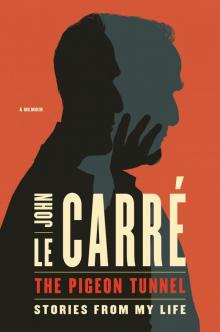 The Pigeon Tunnel: Stories From My Life
The Pigeon Tunnel: Stories From My Life Single & Single
Single & Single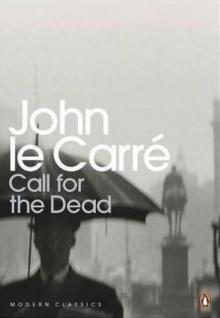 The Spy Who Came in From the Cold
The Spy Who Came in From the Cold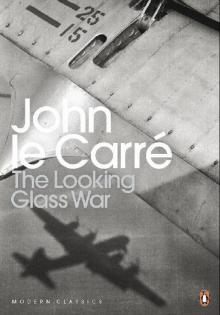 The Looking Glass War
The Looking Glass War The Night Manager
The Night Manager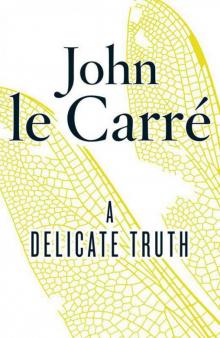 A Delicate Truth
A Delicate Truth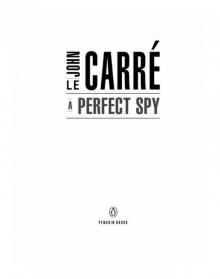 A Perfect Spy
A Perfect Spy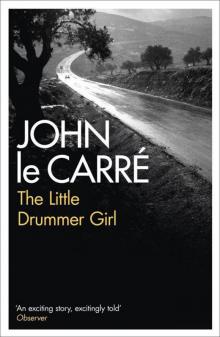 The Little Drummer Girl
The Little Drummer Girl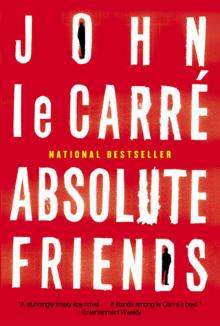 Absolute Friends
Absolute Friends A Murder of Quality AND Call for the Dead
A Murder of Quality AND Call for the Dead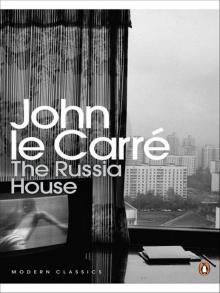 The Russia House
The Russia House The Tailor of Panama
The Tailor of Panama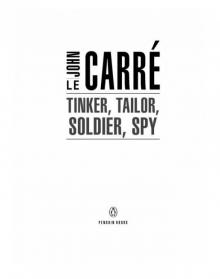 Tinker, Tailor, Soldier, Spy
Tinker, Tailor, Soldier, Spy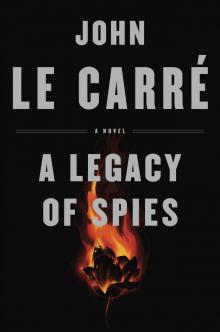 A Legacy of Spies
A Legacy of Spies The Mission Song
The Mission Song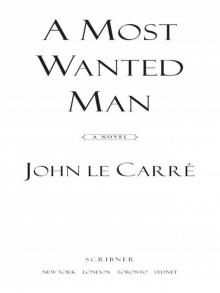 A Most Wanted Man
A Most Wanted Man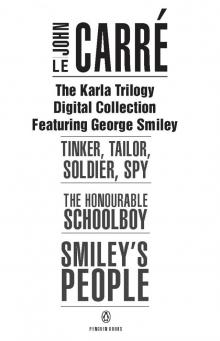 John Le Carré: Three Complete Novels
John Le Carré: Three Complete Novels The Secret Pilgrim
The Secret Pilgrim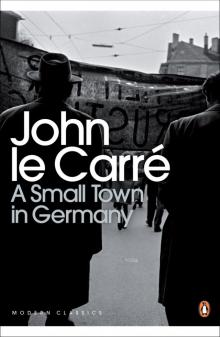 A Small Town in Germany
A Small Town in Germany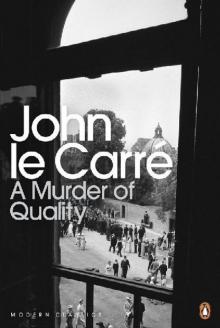 A Murder of Quality
A Murder of Quality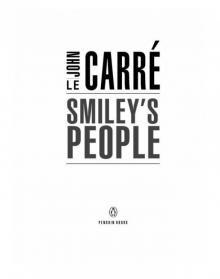 Smiley's People
Smiley's People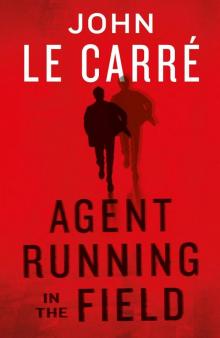 Agent Running in the Field
Agent Running in the Field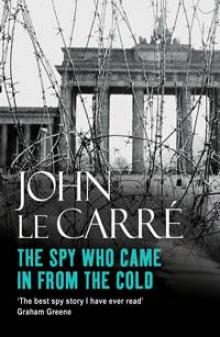 The Spy Who Came in from the Cold s-3
The Spy Who Came in from the Cold s-3 The Pigeon Tunnel
The Pigeon Tunnel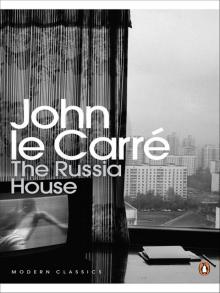 The Russia House - 13
The Russia House - 13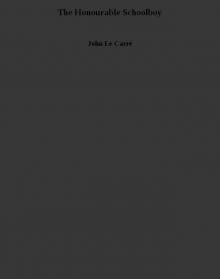 The Honourable Schoolboy
The Honourable Schoolboy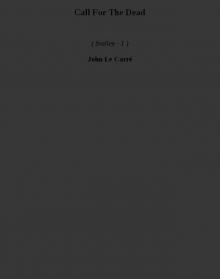 Call For The Dead s-1
Call For The Dead s-1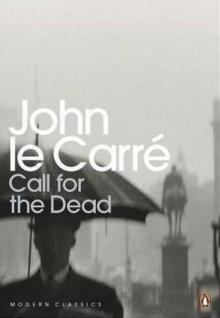 Call for the Dead
Call for the Dead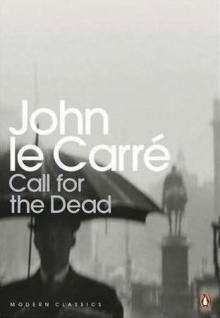 Call for the Dead - 1
Call for the Dead - 1